As a parent, you want to help your kids grow and learn important life skills. Giving them chores is a great way to teach them responsibility, time management, and the value of hard work. But, you might wonder what tasks are right for your child and how to teach them effectively.
It’s important to give kids tasks that fit their age. This helps them learn to contribute to the household and develop a strong work ethic. But, how do you start teaching responsibility through chores, and how can you make sure your child learns valuable lessons?
Key Takeaways
- Assigning chores for kids helps teach responsibility and time management
- Age-appropriate tasks are essential for developing life skills in children
- Creating an effective chore system can help your child understand the value of hard work
- Chores for kids can help develop a strong work ethic and contribute to household responsibilities
- Teaching responsibility through chores for kids is an ongoing process that requires patience and consistency
- By providing your child with age-appropriate tasks, you can help them develop essential life skills that will benefit them throughout their lives
Understanding the Value of Children’s Chores
As a parent, you aim to raise kids who are responsible and independent. Giving them children’s chores is a great way to do this. It helps them learn important life skills like managing time and solving problems. These skills are key to their future success and self-reliance.
Studies show that kids who do household chores do better in school and their careers. Children’s chores teach them about responsibility, teamwork, and communication. By getting your kids involved in daily tasks, you’re setting them up for success.
- Developing life skills, such as cooking, cleaning, and laundry
- Encouraging self-reliance and independence
- Improving time management and problem-solving skills
- Enhancing future success by teaching responsibility and hard work
By making children’s chores a regular part of their lives, you help them grow into capable and confident people. Next, we’ll look at how to set up a chore system that boosts self-reliance and future success.
| Age | Chores | Benefits |
|---|---|---|
| 2-3 | Simple tasks, such as picking up toys | Develops fine motor skills and hand-eye coordination |
| 4-7 | Basic household chores, such as making their bed | Encourages responsibility and self-reliance |
| 8-12 | More complex tasks, such as cooking and cleaning | Develops life skills and time management |
Starting Early: Toddler-Friendly Tasks (Ages 2-3)
As a parent, you want to teach your child the value of responsibility and hard work early. Starting early is key when introducing your toddler to household tasks. At ages 2-3, your child can start with simple, toddler-friendly tasks. These tasks help them develop a strong work ethic and sense of responsibility.
Some examples of toddler-friendly tasks for kids aged 2-3 include:
- Picking up toys and books and putting them away in their proper place
- Helping to sort laundry or put dirty clothes in the hamper
- Assisting with simple meal preparation, such as washing fruits and vegetables
By starting early and introducing your child to these simple tasks, you can help them develop important life skills. These skills and a sense of responsibility will benefit them throughout their lives. Always supervise and guide your child as they complete these tasks. Be sure to praise and encourage them along the way.

| Task | Age | Benefits |
|---|---|---|
| Picking up toys | 2-3 | Develops sense of responsibility and organization |
| Helping with laundry | 2-3 | Introduces concept of teamwork and cooperation |
| Assisting with meal prep | 2-3 | Teaches importance of nutrition and meal planning |
Elementary Age Responsibilities (Ages 4-7)
When your child starts elementary school, they can handle more tasks. Kids aged 4-7 can begin to learn elementary age responsibilities. These skills are important for their future. Simple chores like making their bed or putting away toys teach them to help out at home.
Some simple cleaning tasks for kids in this age include:
- Putting away toys and books after playtime
- Helping to set the table for meals
- Assisting with simple laundry tasks, such as sorting clothes
Kids can also start with personal care duties like brushing their teeth or washing hands. They can learn basic organization skills too. This includes keeping their room tidy or using a calendar for appointments.
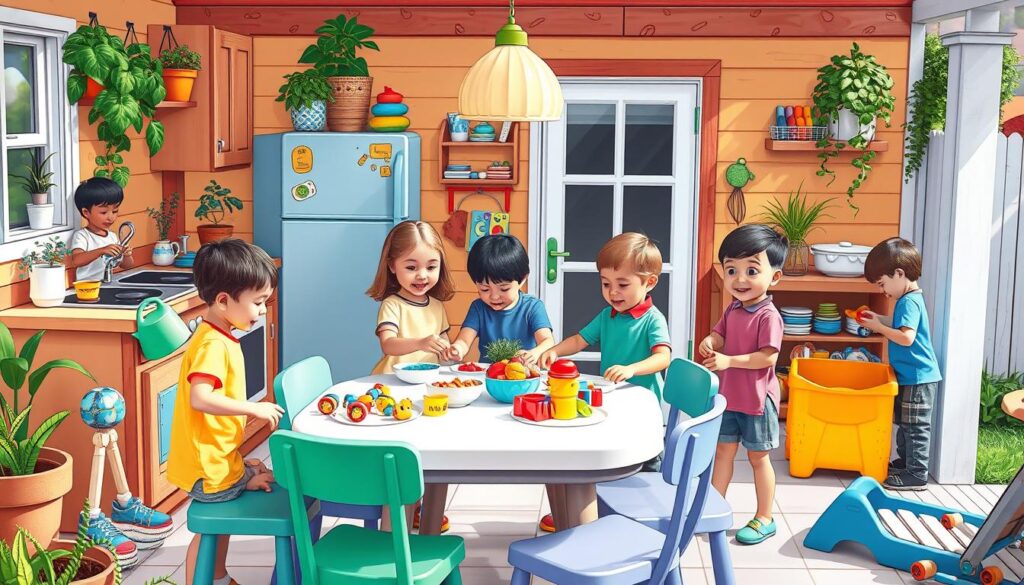
Introducing these tasks early helps your child develop a strong work ethic. It also builds a sense of responsibility. Always praise and encourage your child as they learn these new skills. Offer help and support when they need it.
Chores for Kids: Age-Appropriate Tasks That Teach Responsibility in Middle Childhood
When your child reaches middle childhood, they’re ready for more. They can start learning important life skills. Giving them age-appropriate tasks helps them feel responsible and independent.
Tasks for kids in middle childhood might include:
- Helping with laundry and folding clothes
- Assisting with meal preparation and cooking
- Taking care of pets and feeding them
- Participating in yard work and gardening
Every child is unique, so tasks should match their skills and interests. This way, they’ll feel proud of their work and learn to be responsible.
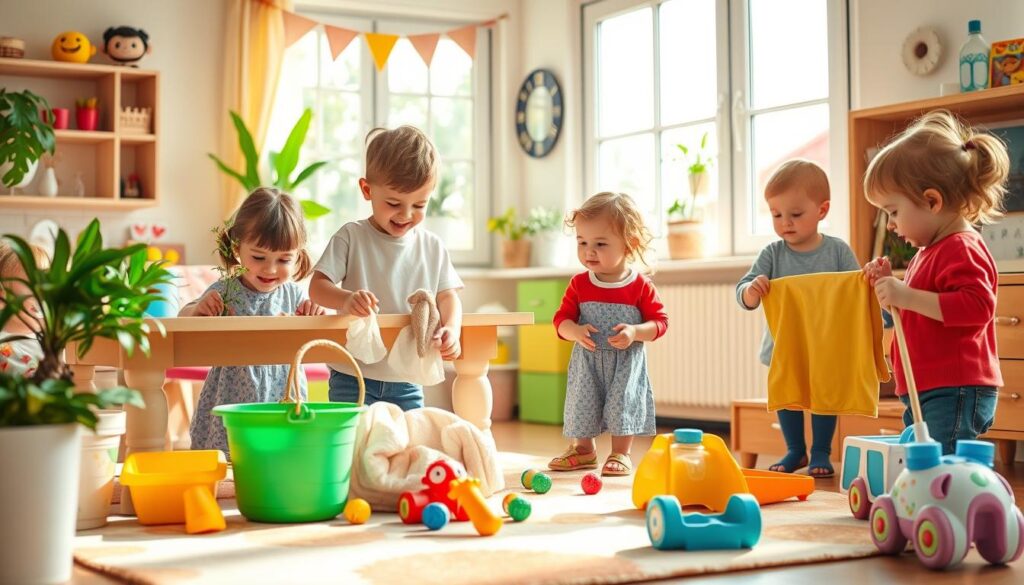
Positive feedback and recognition are key. They show your child the value of helping out at home. As they grow in middle childhood, be patient and supportive. They’ll do great with their new tasks.
Advanced Responsibilities for Preteens (Ages 11-13)
When your child hits the preteen years, they’re ready for more. At ages 11-13, they can start learning important life skills. Giving them tasks like kitchen work, laundry, and outdoor jobs helps them grow up.
Some tasks that fit well for preteens include:
- Preparing simple meals and snacks
- Loading and unloading the dishwasher
- Washing, drying, and folding their own clothes
- Assisting with yard work, such as mowing the lawn or watering plants
Assigning these tasks helps your preteen feel more responsible. It’s good to have a chore chart and a reward system. This way, they get praise, stickers, or small rewards for doing a great job.
Always be there to guide and support your preteen. Let them know it’s okay to ask for help. Together, you can build their confidence and skills for the future.
Creating an Effective Chore System
To have a successful home, you need a good effective chore system. This means making a chore chart that shows who does what. A clear chart helps everyone know their jobs and keeps the house tidy.
A big part of a good effective chore system is a reward system. It makes family members want to do their chores. You can give rewards like more screen time, a later bedtime, or a fun outing.
Here are some tips for a good effective chore system:
- Give tasks based on age and skill
- Make a schedule and follow it
- Thank and reward when tasks are done
- Change the system if needed
By using these tips and a clear reward system, you can teach your kids responsibility. This helps keep your home peaceful and happy.
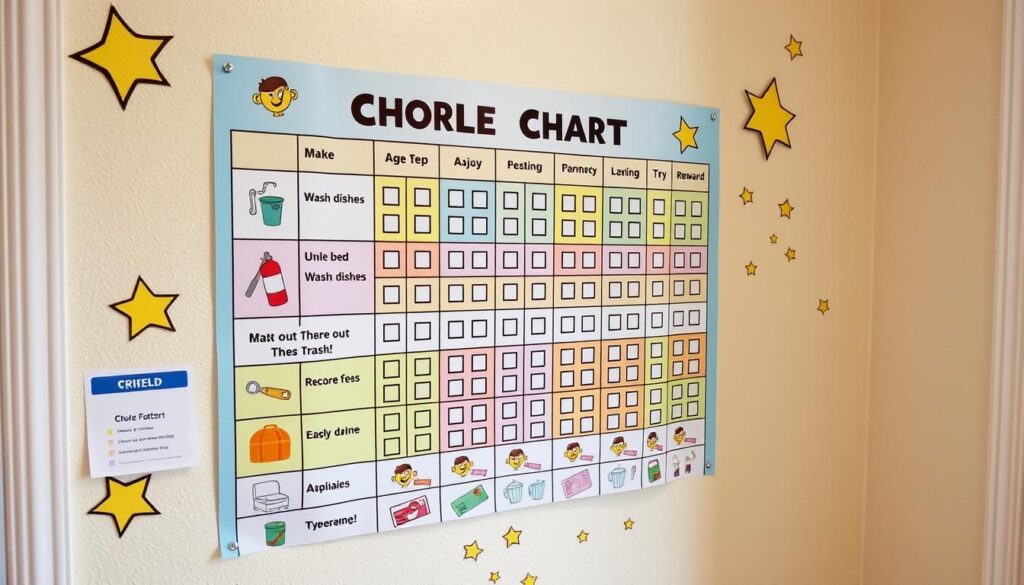
| Task | Responsibility | Reward |
|---|---|---|
| Daily cleaning | Each family member | Extra screen time |
| Laundry | Older kids | Later bedtime |
| Outdoor maintenance | Adults | Special outing |
Motivation Techniques and Reward Systems
As a parent, you want your child to take pride in their chores. You can use different ways to motivate them. Non-monetary rewards help your child feel responsible and motivated from within.
Reward systems can really help your child do their chores. You can give them special privileges like more screen time or a later bedtime. It’s also key to celebrate their achievements. This makes them want to keep up the good work.
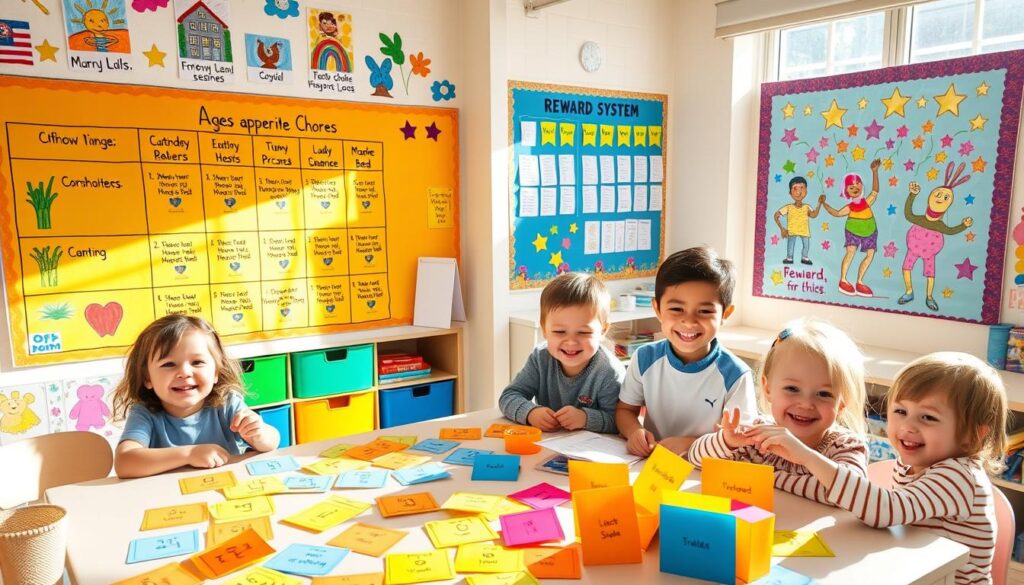
Non-Monetary Rewards That Work
Non-monetary rewards can be just as good as money. Here are some examples:
- Special privileges, such as choosing the dinner menu or having a friend over
- Extra time for activities they enjoy, such as reading or playing games
- Verbal praise and recognition for a job well done
Building Intrinsic Motivation
Helping your child develop a strong work ethic is key. You can do this by:
- Encouraging your child to take ownership of their tasks and make decisions about how to complete them
- Providing opportunities for your child to learn new skills and take on new challenges
- Celebrating achievements and recognizing progress along the way
Celebrating Achievements
Celebrating your child’s achievements is vital. It helps them feel good about their hard work. You can celebrate with a special dinner or outing.
Overcoming Common Challenges and Resistance
When you start a chore system, your child might resist. It’s important to talk openly and explain why their help is needed. This helps them feel responsible and less resistant to helping out.
Being consistent is key to a good chore system. Set a routine that fits your family and stick to it. Give your child praise for their hard work. This encouragement keeps them motivated to help.
Some common challenges you might face include:
- Lack of motivation
- Difficulty in creating a routine
- Resistance to new tasks
To tackle these issues, try these tips:
- Make chores a family effort, working together
- Let your child choose which chores they like best
- Offer rewards for completing chores, like extra screen time or a fun outing

By using these strategies, you can help your child overcome resistance. Be patient and flexible as they learn new responsibilities. With time and encouragement, they’ll develop important life skills and a strong work ethic.
Technology and Chore Management Apps
As a parent, finding ways to make chores easier is a big goal. Technology offers many tools and apps to help. These tools can make assigning chores, tracking progress, and rewarding good work easier.
Technology lets you use apps to manage chores. These apps help you assign tasks, set reminders, and track progress. Apps like ChoreMonster and Cozi Family Organizer are great for teaching kids about responsibility and time management.
Popular Chore-Tracking Applications
Choosing a chore-tracking app can be tough. Here are some popular ones:
- ChoreMonster: an app that lets you assign tasks, set reminders, and track progress
- Cozi Family Organizer: an app that manages chores, schedules, and to-do lists
- HomeRoutines: an app with tools to manage household chores and tasks
Digital Reward Systems
Digital reward systems can also motivate kids to do chores. These systems offer rewards for tasks done, like allowance or extra privileges. Apps like RewardSticks and ChoreCheck are great for teaching kids about hard work and responsibility in a fun way.
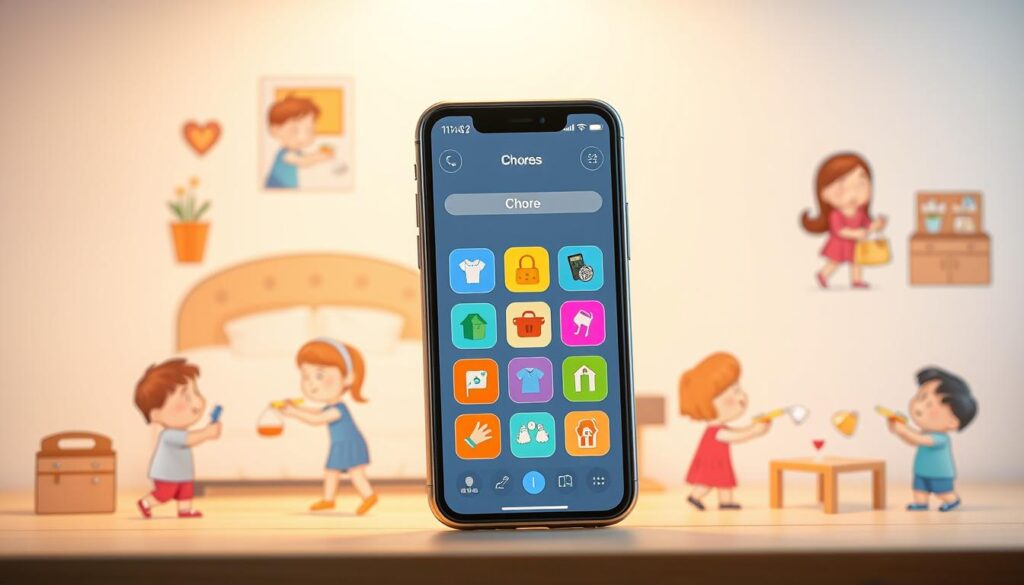
Technology, like apps and digital reward systems, helps create a good chore system. It teaches kids about responsibility and time management. With the right tools, managing chores becomes easier and more fun for everyone.
Teaching Financial Responsibility Through Chores
As a parent, teaching your child about teaching financial responsibility is key. By using allowance systems and saving and spending lessons, you can teach them important life skills. It’s vital to start early and make it fun and interactive.
Here are some tips to help you get started:
- Set clear expectations and goals for your child’s allowance systems
- Encourage your child to save a portion of their allowance and teach them about the importance of saving and spending lessons
- Help your child understand the value of money and how to make smart financial decisions
By following these tips, you can help your child develop a good relationship with money. This will set them up for financial success in the future. Be patient and consistent, and always offer positive support as they learn.
With time and practice, your child will grow more confident in managing their finances. You’ll be proud of the responsible and financially savvy person they’re becoming. So, start today and give your child the gift of teaching financial responsibility?
Seasonal and Special Occasion Tasks
Teaching your child about responsibility and teamwork is important. You can do this by adding seasonal and special occasion tasks. Seasonal tasks like shoveling snow or mowing the lawn teach them to care for their surroundings. Special occasion tasks like decorating for holidays or planning parties show them the value of teamwork.
Some seasonal tasks include:
- Raking leaves in the fall
- Shoveling snow in the winter
- Planting flowers in the spring
- Mowing the lawn in the summer
These tasks help your child feel responsible and connected to their community. Holiday chores like decorating or cooking special meals also teach them about tradition and culture.
Adding seasonal tasks and special occasion tasks to your child’s routine is beneficial. It helps them develop responsibility, teamwork, and community connection. Start small and increase tasks as they grow more confident and capable.
With patience, consistency, and positive feedback, your child will grow into a responsible and compassionate person. By making seasonal tasks and special occasion tasks a regular part of their life, they will become more confident and caring.
Conclusion: Empowering Children Through Household Responsibilities
Empowering children through household responsibilities is a great way to teach them important life skills. Skills like responsibility, time management, and self-reliance are key. By making them feel responsible for their chores, they learn to work hard and find their purpose.
Make sure the chores fit their age and get harder as they grow. Praise their hard work and make them feel important. This way, they’ll learn to be independent and contribute to the family.
Remember, the skills they learn from doing chores will help them in the future. It’s a chance to prepare them for success in life. So, let’s use this time to empower our children and help them thrive.
